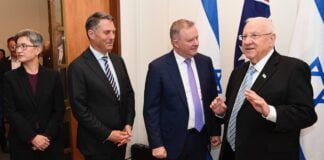THE NSW Labor party has been wracked by a bitter dispute over the government’s attempt to privatise the power industry.
Labor Premier Morris Iemma’s plan has been opposed by the bulk of the party membership and by the unions. Their stand at the party’s state conference saw the sale rejected by the huge margin of 702 to 107 votes.
Why is Iemma so fixated on privatisation? Polls have consistently recorded over 80 per cent oppose it. But the leading ranks of the party have come solidly behind the state government. Former NSW Labor premiers Bob Carr, Neville Wran and Barrie Unsworth signed a letter to Labor MPs urging them to support the sale. Kevin Rudd voiced his support. Even former prime minister Paul Keating weighed in to denounce the unions’ and Labor membership’s opposition.
The obsession with privatisation is part of a wider commitment amongst the Labor party leadership to economic rationalist policies which favour business over working class people.
Economic rationalist policies were pioneered by the Hawke-Keating Labor government in the 1980s. They forced through wage cuts and restrained spending on public services in order to cut corporate taxes and boost profitability. In their first six years in power they raised the share of national income going to profits by about 10 per cent at the expense of wages. Hawke and Keating also privatised the Commonwealth bank and Qantas.
Governments around the world adopted the same sort of policies during this period. This represented an attempt to rescue big business from the slump in profits brought about by a protracted period of recession from the mid-1970s. Economic rationalist ideas have remained the consensus amongst the ruling class-and therefore amongst the leadership of the Labor party, and other social democratic parties around the world.
Working class party
Historically, Labor has been the party of unions and the working class. But the leadership of the party has always set out to loyally run the capitalist system. When rank-and-file members and the unions have fought within the party, they have been able to blunt the efforts of Labor governments to pursue right-wing policies. Power privatisation was defeated once before in NSW after the Labor conference voted it down in 1997.
Union officials set up the party, and retain half the votes at Labor party conferences. But this relationship has been under increasing strain. The party leadership’s move rightwards has put them in conflict with many of the unions.
Those trying to further Labor’s lurch to the right want union influence reduced because it will make it easier to pursue right-wing policies. In 2002 then Labor leader Simon Crean succeeded in reducing the union vote from 60 to 50 per cent of conference. Recently Mark Aarons writing in Dear Mr Rudd railed against the “power exercised by union secretaries over policy-making and the selection of members of parliament” inside the ALP.
Socialists defend the role of unions inside Labor because they represent a link to the working class movement. But at the same time the top union officials are heavily tied into the bureaucratic structures of the party, and are rarely prepared to lead a serious fight.
Morris Iemma’s contempt for the unions and the basic democratic structures of the party shows the need for Labor party members to unite with others to build a movement with others outside the party, to demand an end to the economic rationalist agenda.





